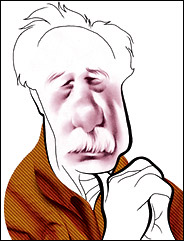 Apart from the fact that the entire novel is one long paragraph, Austerlitz is also a novel that does not want to be a novel. Is it a mock-biography? A picture book of sorts? A reflection on architecture, time, and memory? It’s really hard to say. One thing that is certain however is that whatever we chose to call the book, it is pure and simply unforgettable. How can it not be? A book that tries to tell a story about how remembering becomes both the impossibility and the necessity to remember. Unforgettable also is what a friend of mine described as the book’s “prettiness of prose.”
Apart from the fact that the entire novel is one long paragraph, Austerlitz is also a novel that does not want to be a novel. Is it a mock-biography? A picture book of sorts? A reflection on architecture, time, and memory? It’s really hard to say. One thing that is certain however is that whatever we chose to call the book, it is pure and simply unforgettable. How can it not be? A book that tries to tell a story about how remembering becomes both the impossibility and the necessity to remember. Unforgettable also is what a friend of mine described as the book’s “prettiness of prose.”
W. G. Sebald seems to be inviting us to consider the possibility that the past is never really past because like a ghost, it lives with and within us. But this past, violent as it is, never dies but then never appears in its full form. Instead, it presents itself in flashes, in broken fragments, hovering over memory in dark ghostly outlines. How, Sebald wants to ask, do you write a story about these pieces of fragments from the past that resist any kind of recomposition? The past in question is the Holocaust.
Austerlitz is the name of the main character. He is taken from his home in Prague in the Kindertransport, a special train used to evacuate children to other parts of Europe before WWII broke out. Adopted by a Welsh preacher, he lives most of his life in England without knowing the truth about his origins. It is not that he is completely unaware of his past, but that he has somehow consciously forgotten about it. The novel is really how he moves from this self-orchestrated forgetting to a path of inquiry that ends in a way that might disappoint the naive reader expecting some kind of grand discovery.
It is perhaps important to note that Sebald is interested in the generation after the war: Jews, who did not experience the Holocaust directly but whose lives have invariably been shaped by the event. What does it mean to be linked to something in which you were not direct involved but that continues to haunt your present and to delimit your sense of life and the world? Unlike the typical novel about memory that pulls the reader along with an enticing secret and the promise to reveal something earth shattering, the reader of Austerlitz is both aware and unaware of the reason for Austerlitz’s estrangement from his world and the anxiety that unsettles him throughout the novel. Actually, Austerlitz shares with the reader this condition of being in relation to a mystery that is simultaneously closed and open. In a sense, he is searching for something that he already knows: the unspeakable violence that has brought upon him a loss that refuses to be forgotten?
Austerlitz was Sebald’s last book. He died the same year he wrote the book, in 2001.
Interesting blog dedicated to Sebald’s writings: Vertigo
Credits
First photo: C’est La Guerre
Second: New York Times








Walks of Discovery: Open City by Teju Cole | Brittle Paper June 13, 2011 17:31
[...] a long tradition of novels, from Rilke‘s Notebooks of Malte Laurids Brigge to Sebald‘s Austerlitz, where readers inhabit the mind of a character, through whom they see and think the world. In [...]